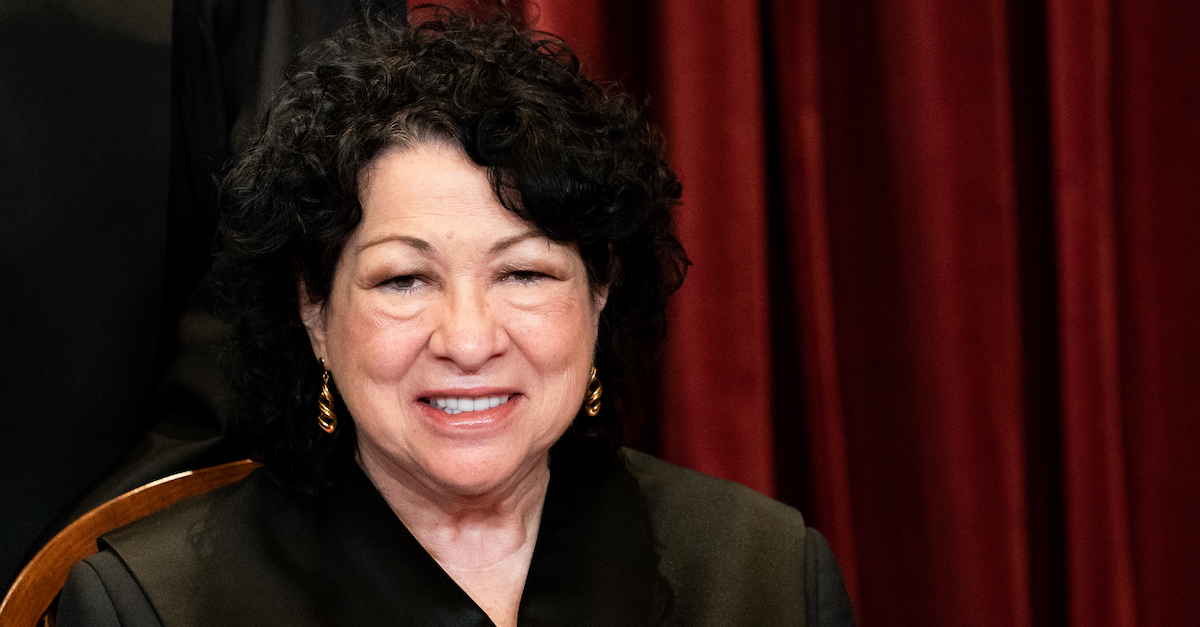
WASHINGTON, DC – APRIL 23: Associate Justice Sonia Sotomayor sits during a group photo of the Justices at the Supreme Court in Washington, D.C. on April 23, 2021.
In a 6-3 ruling that crossed ideological lines, the Supreme Court on Friday held that organizations known as Alaska Native Corporations (ANCs) are included in the definition of “Indian tribes” under federal law — and are therefore eligible for money made available to American Indians under a provision of the 2020 CARES Act. The provision sought to provide COVID-19 relief to those economically harmed by the pandemic.
“The Court today affirms what the Federal Government has maintained for almost half a century: ANCs are Indian Tribes under ISDA,” Justice Sonia Sotomayor wrote for the majority in Yellen v. Confederated Tribes of the Chehalis Reservation, et. al. “For that reason, they are Indian tribes under the CARES Act and eligible for Title V funding.”
Sotomayor was joined by Justices John Roberts, Stephen Breyer, Brett Kavanaugh, Amy Coney Barrett, and, in part, Samuel Alito.
Justice Neil Gorsuch wrote the dissent, in which Justices Clarence Thomas and Elena Kagan joined.
The decision isn’t entirely surprising, as several of the justices seemed skeptical of the Indian tribes’ position at oral argument in April.
The issue in the case was whether Alaska Native Corporations (ANCs) are eligible to receive any of the $8 billion allocated to “tribal governments” in the Coronavirus Aid, Relief, and Economic Security (CARES) Act passed by Congress in March 2020.
Around $500 million of that $8 billion was set aside for ANCs, and a group of federally-recognized Indian tribes objected. The parties disagreed about whether ANCs are “recognized as eligible for special programs and services provided by the United States to Indians because of their status as Indians.”
This is because the “recognized as eligible” clause limited the definition to “federally recognized tribes” only, which the ANCs were not — they are private companies incorporated under state law, and have never been “recognized” by the U.S. in a “sovereign political sense,” the Court said.
“Under the plain meaning of ISDA, ANCs are Indian tribes, regardless of whether they are also federally recognized tribes,” Sotomayor wrote. “In so holding, the Court does not open the door to other Indian groups that have not been federally recognized becoming Indian tribes under ISDA.”
Gorsuch disagreed, saying that the majority’s “plain meaning” conclusion is “far from clear.” He argued that the Court’s argument is “a bare assertion that the recognition clause carries a different meaning when applied to ANCs than when applied to anyone else.”
The tribal governments had also argued that the ANCs had received federal funding pursuant to other parts of the CARES Act and were depriving federally-recognized Indian governments across the country of that money.
The ANCSA Regional Association and Alaska Native Village Corporation Association welcomed the Supreme Court’s decision Friday.
“We are pleased to see the Court affirm Alaska Native corporations’ eligibility for CARES Act funds to help our people and communities recover from the devastating effects of COVID-19. Alaska’s economy is only now starting to recover, and these funds are needed to help our communities get back on their feet,” the groups said in a joint statement. “ARA and ANVCA are committed to building greater understanding about the critical roles ANCs play in the lives of Alaska Native people, and we stand ready to unite with Indian Country to better serve all of our Indigenous communities.”
The Indian tribes, on the other hand, were disappointed with the news.
“We disagree with the Court’s ruling today. ANCs are not Indian tribes and do not have tribal governments,” Harry Pickernell, Sr., Chairman of the Confederated Tribes of the Chehalis Reservation, said in a statement. “But we are heartened that the Court made clear that ANCs are not federally recognized, are not sovereigns, do not have a government-to-government relationship with the United States, and should not be included on the Department of the Interior’s list of federally recognized tribes.”
Teri Gobin, Chairwoman of the Tulalip Tribes, said that the ruling is “very disappointing because ANCs are state-chartered, for-profit companies, many of whose shareholders include non-Indians.”
Michael Williams, Sr., Chief of the Akiak Native Community, one of six tribal plaintiffs hailing from Alaska, said that “today’s decision takes away critical CARES Act funds from tribes and gives it to corporations that do not share that responsibility,” but expressed gratitude that the Supreme Court “confirmed that ANCs are not sovereigns, are not tribal governments, and have not entered a government-to-government with the United States. Alaska’s 229 tribes—not ANCs—are the seats of sovereignty in Alaska.”
Both the majority opinion and dissent include a history lesson about ANCs, efforts to determine the legislative intent of the ANCSA and the Indian Self-Determination and Education Assistance Act (ISDA), and a somewhat circuitous ceviche metaphor by Sotomayor that Gorsuch, in his dissent, called “a bit underdone.”
Read the Supreme Court’s decision, below.
[Image via Erin Schaff/Getty Images]
This story has been updated to include statements from representatives of the Indian tribes.